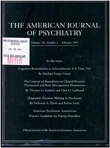Conditions not attributable to a mental disorder: an epidemiological study of family problems
Abstract
OBJECTIVE: The objective of this research was to identify and measure the differences among three groups of psychiatric outpatients: those with family problems but without mental disorders, those with both family problems and mental disorders, and those with a mental disorder but without family problems. DSM-III V code conditions (conditions not attributable to a mental disorder) other than family problems do occur, but family problems were chosen because of their importance. METHOD: All patients admitted to an outpatient psychiatric clinic during a 2- year period were studied (N = 382). Of these, 92 had V code conditions unrelated to family problems and were excluded. Data are presented on the remaining 290 patients. Sociodemographic variables, DSM-III diagnoses, source of referral, previous and subsequent use of outpatient services, and type of family problem were examined. Patients were from a low-income population and came from three ethnic groups (white, black, and Hispanic). RESULTS: Among whites, more men than women had family problems without mental disorders; among blacks, more women than men had family problems with and without mental disorders. Marital problems occurred most frequently in the group with family problems without mental disorders, and married subjects were more likely to have a V code condition. Professional referrals were more common than other referral sources in all three groups. However, family problems without mental disorders were more likely to occur among those who were referred by their families and had never had psychiatric treatment; patients with family problems and mental disorders were more likely to be self-referred and to have been previously treated; those with a mental disorder but without family problems were usually referred by professionals and almost always had been previously treated. There appeared to be underreporting of family problems among those with family problems and mental disorders and among black men with family problems with and without mental disorders. CONCLUSIONS: More research is needed on the patterns of use of outpatient psychiatric services by individuals with family problems and other V code conditions.
Access content
To read the fulltext, please use one of the options below to sign in or purchase access.- Personal login
- Institutional Login
- Sign in via OpenAthens
- Register for access
-
Please login/register if you wish to pair your device and check access availability.
Not a subscriber?
PsychiatryOnline subscription options offer access to the DSM-5 library, books, journals, CME, and patient resources. This all-in-one virtual library provides psychiatrists and mental health professionals with key resources for diagnosis, treatment, research, and professional development.
Need more help? PsychiatryOnline Customer Service may be reached by emailing [email protected] or by calling 800-368-5777 (in the U.S.) or 703-907-7322 (outside the U.S.).



